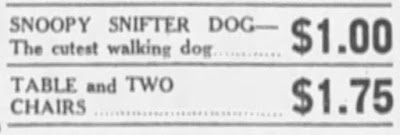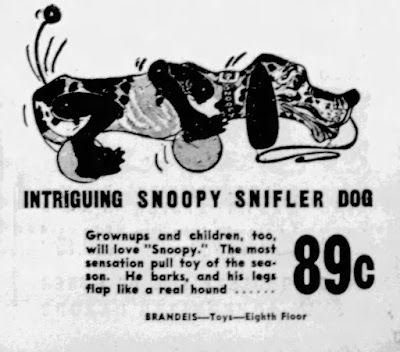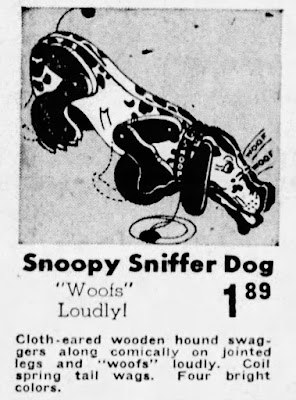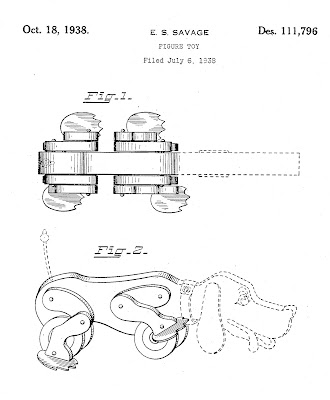Calvin Broadus, Jr. borrowed his rap moniker, Snoop Dogg, from the name of the dog in Charles Schultz’s Peanuts comic strip, Snoopy. His mother gave him the nickname as a young boy because he liked the character.i
Charles Schultz’s mother had once, reportedly, wanted to name their family dog “Snoopy.” They settled on “Spike,” but Charles later used the name for the dog
in Peanuts. He had originally wanted to name the character Sniffy, but chose Snoopy after seeing a comic strip in a magazine with a dog by that name.ii Spike later joined the cast as Snoopy's brother.
But where Mrs. Schultz get the name? In the 1937 film, “Easy Living,” starring Jean Arthur and Ray Milland, Arthur’s character has a dog named “Snoopy.” LINK: “Easy Living” YouTube clip - Mary brings the dogs in.iii
Was Snoopy a common dog name before Snoopy’s first appearance in Peanuts?
As it turns out, the name “Snoopy,” and the word itself, had long been associated with dogs (and cats). One of the earliest descriptions of the word, “snoopy,” in print even defined the word with respect to cats and dogs.
Some Colloquial Observations.
E. M. Wilson of Belfast, Allegany County, writes to the Rochester Post-Express a letter discussing certain “Colloquialisms of the UPper Genesee.” Information on such subjects is generally interesting, and some at least of Mr. Wilson’s statements will be novel to the general reader.
He says, for instance, . . . that not only the verb to “snoop” - a not uncommon word in New England and perhaps throughout the country - is used, but also the adjective “snoopy” and the noun “snoop,” a “snoopy” dog or cat being one that helps himself to forbidden food and a “snoop” being a person who pries into other people’s affairs. . . .
Buffalo Courier (Buffalo, New York), February 4, 1895, page 4.
But the expression was perhaps not as regional or as unknown as the writer assumed.
In 1897, the word was included in a “Dialect Word-List” of words “heard in Kansas.”
snoopy: like a ‘snoop.’
“Dialect Word-List. - NO. 3,” W. H. Carruth, Kansas University Quarterly, Volume 6, Number 1, January 1897, page 57.
And had appeared in print in Kansas years earlier.
Wonder if it’s worse to like two kittens than a snoopy old cat, and his ugly Maje.
The Times (Clay Center, Kansas), January 25, 1883, page 8.
“Snoopy” appeared in print more frequently and in more places after 1900, frequently in relation to dogs and cats.
Judge Criswell backs up his theory that the [dog’s] death was accidental on account of the fact that the pointer dog is rather a “snoopy” animal.
The News-Herald (Franklin, Pennsylvania), January 7, 1903, page 6.
During one of the lineups of the show girls down stage, a snoopy little Boston bulldog belonging to one of the young women on the stage, having gained his freedom from her dressing room, walked unconcernedly, albeit somewhat suspiciously, out on to the stage, standing still to yawn and stretch right in front of the singing and tripping line of young women.
Pittsburgh Daily Post, February 18, 1906, Fourth Part, page 30.
There is a great clatter, however, when a certain large, gray, snoopy cat sneaks across the corner of the yard to his lair under the neighboring barn . . . .
The Pantagraph (Bloomington, Illinois), June 13, 1914, page 16.
Minneapolis Journal, March 4, 1923, page 10.
Schultz’s mother was not the only person to consider naming a dog (or cat) “Snoopy”; many people actually did.
In 1930, the actor, Edmund Lowe, had a dog named “Snoopy,” and the actor, Alec Gray, had a cat of the same name.
“Can you see what Champ and Snoopy will do to that white carpet when they come to wake us up in the morning?” [Lowe said.] Champ and Snoopy are Eddie’s two pet wire-haired terriers.
Screenland, Volume 20, Number 4, February 1930, page 101.
Talking Screen, July 1930, page 85.
The double-threat magician/actor, Fred Keating, also had a dog named “Snoopy.”
“The star boarder of the Fred Keating menage is Snoopy. He has all the privileges of a star boarder, too, even to piano sitting when Fred is tickling the ivories.”
Photoplay, Volume 47, Number 5, April 1935, page 90.
Dear [Boys and Girls] Page Editor: This is my first letter to you. I have four sisters and one brother. I have a dog named Snap and a cat named Snoopy for my pets.
St. Joseph News-Press (St. Joseph, Missouri), September 3, 1944, page 10B.
Schultz’s Snoopy was not even the first fictional, cartoon Snoopy. During the 1920s, a fictional bobcat named Snoopy was a recurring character in the syndicated series of children’s stories, the “Tinker Bob” Stories, by Carlysle H. Holcomb. On occasion, Snoopy appeared in cartoon form in the single panel accompanying most of the episodes.
Americus Times-Recorder (Americus, Georgia), January 7, 1920, page 2.
Americus Times-Recorder (Americus, Georgia), January 11, 1920, page 3.
And beginning in about 1938, when Schultz would have been about sixteen years old, an animated, wooden “Snoopy” dog pull-toy, in the shape of a beagle (the nominal breed of Schultz’s Snoopy dog) were widely marketed throughout the United States and Canada. A few examples:
SNOOPY SNIFTER DOG - The cutest walking dog . . . . $1.00.
The Long Beach Sun (Long Beach, California), November 28, 1938, page 2.
Omaha World Herald, December 22, 1938, page 19.
The Gazette (Montreal, Quebec), December 13, 1940, page 5.
Shreveport Journal (Shreveport, Louisiana), November 18, 1946, page 3.
But they weren’t all beagles; some looked more like a cocker spaniel.
Moline Dispatch (Moline, Illinois), November 20, 1947, page 23.
When Schultz named the cartoon dog in 1950, readers may have seen the name as being as natural and unsurprising as "Spot" or "Fido." But the success of the comic strip and popularity of the dog named Snoopy has long since overshadowed the once common association between "snoopy" and dogs.
And more importantly, perhaps, completely obliterated the historic association of "snoopy" with cats. Snoopy would approve.
https://www.vintageaddictions.com/listing/583122184/vintage-snoopy-dog-180-wooden-pull-toy
i NBCChicago.com, “Snoop Dogg Tells Money Honey He was Named After Snoopy, November 16, 2009. https://www.nbcchicago.com/news/national-international/snoop_dogg_tells_money_honey_he_was_named_after_snoopy/1883645/
ii ABC11.com, Justin Sedgwick, “7 Things You Didn’t Know About Charlie Brown and ‘Peanuts’”, November 30, 2015. https://abc11.com/peanuts-charlie-brown-charles-schulz-snoopy/1012423/
iii YouTube clip - https://youtu.be/z04HoB9FboI?t=108











nice
ReplyDeleteWords can’t express how thankful I am.
ReplyDelete